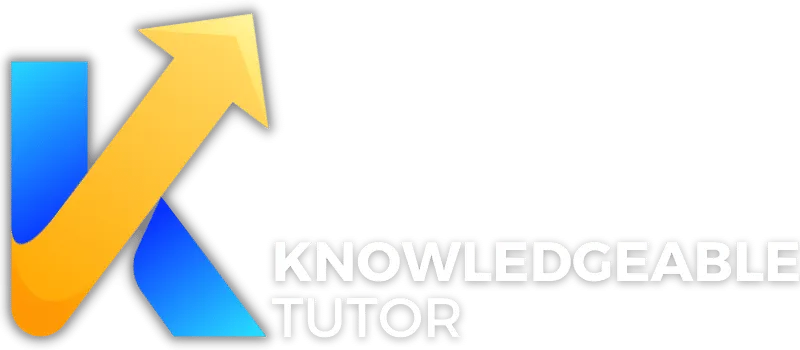Qualifications for Becoming
an Online Tutor

Fanie Naude
CEO & Founder of Knowledgeable Tutor, Buznet Direct, YMC & Naude Consulting

Fanie Naude
CEO & Founder of Knowledgeable Tutor, Buznet Direct, YMC & Naude Consulting

The digital transformation of education has elevated online tutoring from a mere trend to a formidable industry. Aspiring online tutors must navigate a labyrinth of qualifications, skills, and strategies to succeed in this burgeoning field. This comprehensive article delves into the essential facets of becoming an online tutor, from educational requirements and skill sets to legal compliance and advanced growth strategies.
Article Summary
- Educational Requirements: From high school diplomas to master's degrees, the article outlines the educational milestones crucial for an online tutor.
- Skills Required: Beyond academic qualifications, the article emphasizes the importance of both soft and hard skills.
- Experience: The role of both traditional teaching and online tutoring experience in building a robust profile.
- Specializations: The strategic importance of specializing in specific subjects or skills.
- Legal Requirements: A guide to the legal landscape, including work authorization and background checks.
- Ethical Considerations: The article underscores the importance of ethical practices in establishing trust and credibility.
- Building a Portfolio: How a well-crafted portfolio can serve as your professional storybook.
- Online Presence: The significance of personal branding and social media in building and maintaining a strong online presence.
- Advanced Strategies: Once the basics are in place, the article discusses strategies for scaling your online tutoring business.
As Albert Einstein once said, "It is the supreme art of the teacher to awaken joy in creative expression and knowledge." This article serves as a comprehensive guide to mastering that art in the digital realm, providing aspiring tutors with the tools they need to excel.
Let's embark on this enlightening journey, shall we?

I. Introduction
The Growing Demand for Online Tutors
Online tutoring is not just a trend; it's a seismic shift in how education is delivered and experienced. With the advent of technology and the increasing need for personalized education, online tutoring has become a lucrative career option. According to a report by Technavio, the online tutoring market is expected to grow by $153.07 billion during 2021-2025, progressing at a CAGR of almost 18%.
The Importance of Qualifications
While the field is ripe with opportunities, it's crucial to have the right qualifications to stand out and provide value. Qualifications not only validate your skills but also instill confidence in your potential students and their parents. As Benjamin Franklin once said, "An investment in knowledge pays the best interest."

II. Educational Requirements
Navigating the educational labyrinth to become an online tutor can be daunting, but it's a journey worth embarking upon. Let's dissect the educational milestones you'll need to cross to establish yourself in this rewarding profession.
"Education is the passport to the future, for tomorrow belongs to those who prepare for it today." - Malcolm X
1. High School Diploma
A High School Diploma is often the stepping stone in your educational journey towards becoming an online tutor. It serves as the basic educational requirement, especially for those looking to tutor at the elementary or middle school levels.
- Why It's Basic Yet Crucial
- Validates your foundational skills.
- Opens doors to entry-level tutoring jobs.
2. Bachelor's Degree
Possessing a Bachelor's Degree not only amplifies your subject expertise but also makes you a more attractive candidate for specialized tutoring roles. According to data from Payscale, tutors with a Bachelor's Degree earn approximately 20% more than those with just a high school diploma.
Fields in Demand
- Mathematics
- Science
- English
- Social Studies
Advantages of a Bachelor's Degree
- Specialization in a subject.
- Higher earning potential.
- Greater job opportunities.
For those pondering over which subject to specialize in, our guide on Choosing the Right Subject to Tutor Online offers valuable insights.
3. Master's Degree
A Master's Degree is not mandatory but can be a significant asset, especially for those looking to tutor at the collegiate level or in highly specialized fields.
When It's Beneficial
- Tutoring at collegiate levels.
- Specialized subjects like Quantum Physics or Advanced Calculus.
Why It's Beneficial
- Enhanced credibility.
- Opportunity for higher pay rates.
4. Certifications
While not always obligatory, certifications can serve as a cherry on top of your qualifications cake. They provide third-party validation of your skills and can be particularly useful for subjects that require a high level of expertise or safety considerations.
Types of Certifications
- Subject-specific certifications.
- Teaching English as a Foreign Language (TEFL).
- Child Safety and Welfare.
Advantages of Certifications
- Third-party validation.
- Competitive edge in the job market.
For a deeper dive into the types of certifications available, you might find our article on Qualifications for Becoming an Online Tutor to be a comprehensive resource.

III. Skills Required
In the realm of online tutoring, qualifications go beyond mere academic degrees. Skills, both soft and hard, play an indispensable role in shaping a successful online tutor. As Helen Keller wisely said, "Character cannot be developed in ease and quiet. Only through experience of trial and suffering can the soul be strengthened, ambition inspired, and success achieved."
1. Soft Skills
Soft skills are the intangible qualities that make you not just a tutor but an educator who can connect, inspire, and make learning an enriching experience.
Patience
- The ability to remain calm and composed, especially when dealing with challenging students or complex topics.
Optimism
- A positive outlook that encourages students to believe in their abilities and strive for excellence.
Empathy
- The skill to understand and share the feelings of your students, making you more relatable and approachable.
For those interested in honing their soft skills, our guide on Improving Your Teaching Skills: Tips for Online Tutors offers actionable advice.
2. Technical Skills
In the digital age, technical prowess is not a luxury but a necessity.
Proficiency in Online Tutoring Platforms
- Familiarity with platforms like Zoom, Skype, and specialized tutoring software.
Basic Troubleshooting
- Ability to resolve minor technical glitches that could interrupt a tutoring session.
Data Management
- Skills in organizing and storing educational materials and student records securely.
For a detailed look at the tools and technology that can aid your online tutoring, our article on Tools and Technology for Effective Online Tutoring is a must-read.
3. Subject Expertise
Subject expertise is the cornerstone of effective tutoring. It's not just about knowing the subject but knowing how to teach it.
Depth vs. Breadth of Knowledge
- Depth refers to a deep understanding of fewer topics, whereas breadth refers to a more general understanding of a wider range of topics.
Continuous Learning
- The commitment to staying updated with the latest advancements in your subject area.
Curriculum Alignment
- Ensuring your teaching material is in line with relevant educational standards and curricula.
"The best teacher is the best learner." - Lev Vygotsky

IV. Experience
Experience is the crucible in which theory meets practice, and it's often said that "Experience is the teacher of all things," a sentiment echoed by Julius Caesar. In the context of online tutoring, experience serves as both a credential and a differentiator.
1. Teaching Experience
The Value of Classroom Experience
- Having traditional classroom experience can be a significant asset. It provides you with a foundational understanding of pedagogy, curriculum alignment, and student engagement.
Transitioning to Online
- Leveraging your classroom experience to make a smooth transition to online tutoring.
Internships and Training Programs
- The role of internships and teacher training programs in building your teaching experience.
For those making the transition from traditional to online teaching, our guide on Online Tutoring vs. In-Person Tutoring: Pros and Cons offers valuable insights.
2. Online Tutoring Experience
Platforms and Their Requirements
- Different online tutoring platforms have varying requirements for tutors, from educational qualifications to technical specifications.
Building a Client Base
- Strategies for attracting and retaining students in the online space.
Quality Assurance
- How to maintain and even enhance the quality of your tutoring sessions in an online environment.
For a deeper dive into the world of online tutoring platforms, you may find our article on Understanding Different Online Tutoring Platforms to be particularly enlightening.
"Experience is not what happens to you; it's what you do with what happens to you." - Aldous Huxley

V. Specializations
In the realm of online tutoring, specialization is not just a choice; it's a strategic decision that can significantly impact your career trajectory. As the saying goes, "The riches are in the niches." Specializing allows you to focus on specific subject areas or skills, making you more attractive to a targeted group of students.
1. STEM Fields
High Demand and Better Pay
- STEM (Science, Technology, Engineering, Mathematics) fields are in high demand, often commanding higher rates for tutors.
Credential Requirements
- What qualifications are generally expected for STEM tutors, such as specific degrees or certifications.
Teaching Strategies
- Effective methods for teaching complex STEM subjects online.
For those interested in STEM tutoring, our guide on Teaching Different Subjects: Tips and Techniques offers invaluable advice.
2. Language Tutoring
Requirements for Teaching English or Other Languages
- Language certifications like TEFL, TESOL, or a degree in linguistics can be beneficial.
Cultural Sensitivity
- The importance of understanding cultural nuances when teaching a language.
Resource Utilization
- How to use various online resources effectively for language tutoring.
For language tutors, our article on How to Find Students for Online Tutoring can provide useful strategies for building a student base.
3. Test Prep
Special Qualifications for Test Prep Tutoring
- Some test prep fields require tutors to have taken the test themselves or undergone specialized training.
Material Creation
- The art of creating effective test prep materials and mock tests.
Student Assessment
- How to assess a student's strengths and weaknesses to tailor your test prep strategy.
For those diving into the test prep arena, our comprehensive guide on Online Tutoring for Test Prep: A Guide is a must-read.
"To be a specialist or not to be, that is the question. But remember, specialization without depth is like a paper tiger, impressive but not intimidating." - Anonymous
Specialization allows you to become an expert in a particular field, making you more valuable to students seeking targeted help. Whether it's STEM, language tutoring, or test prep, each has its own set of qualifications and best practices that can set you apart from general tutors.

VI. Legal Requirements
Navigating the labyrinthine corridors of legal requirements is a rite of passage for any online tutor. As Benjamin Franklin once said, "Diligence is the mother of good luck," and nowhere is this more applicable than in ensuring you are legally compliant.
1. Work Authorization
Immigration Laws and Work Permits
- Depending on your location and where your students are based, you may need specific work permits or visas. Failure to comply can result in severe penalties.
Tax Implications
- Understanding the tax obligations in your country and potentially in your students' countries is crucial.
Contracts and Agreements
- Legal contracts that outline the terms and conditions of your tutoring services can protect both you and your students.
For a more in-depth understanding of work authorization, you may refer to our guide on Qualifications for Becoming an Online Tutor.
2. Background Checks
Importance
- Background checks are often mandatory, especially when working with minors. They instill confidence in your clients about your credibility and integrity.
Types of Checks
- Criminal background checks, educational verification, and professional references are standard.
How to Prepare
- Keep all your documents, like diplomas and certificates, readily available. Also, be prepared to provide references.
For those who want to delve deeper into the importance of background checks, our article on Ethical Practices in Online Tutoring is a must-read.
"Ignorance of the law is no excuse," is a legal principle holding true across jurisdictions. Being well-versed in the legal requirements not only safeguards you from potential pitfalls but also elevates your professional standing.
| Key Legal Requirements | Importance | Resources |
|---|---|---|
| Work Authorization | High | Government Websites, Legal Advisors |
| Background Checks | Critical | Police Departments, Online Services |
| Contracts | Essential | Legal Templates, Lawyers |
Legal compliance is not just a checkbox but a continuous process that requires regular updates and checks. It's a foundational pillar that supports the edifice of your online tutoring career. Ignoring it is not an option; mastering it is a necessity.

VII. Ethical Considerations
In the realm of online tutoring, ethical considerations are not just a footnote but the very backbone of your practice. As Immanuel Kant wisely stated, "Act only according to that maxim whereby you can at the same time will that it should become a universal law."
Importance of Maintaining Ethical Practices
Trust and Credibility
- Ethical conduct establishes trust between you and your students, which is the cornerstone of any educational relationship.
Professional Reputation
- Your ethical standing can make or break your career. Word of mouth, especially in the digital age, spreads like wildfire.
Legal Safeguards
- Ethical practices often overlap with legal requirements. Adhering to ethical standards can protect you from legal repercussions.
For those who are keen to explore this subject further, our comprehensive guide on Ethical Practices in Online Tutoring is a treasure trove of insights.
Key Ethical Practices to Follow
Confidentiality
- Protecting the personal information of your students is not just ethical but often legally mandated.
Transparency
- Be upfront about your qualifications, experience, and tutoring methods. Misrepresentation can lead to loss of credibility.
Integrity
- Always deliver what you promise. Whether it's the duration of the tutoring session or the content, integrity is non-negotiable.
"The time is always right to do what is right," Martin Luther King Jr. once said. This holds especially true for online tutors, where the virtual environment should not be a veil to hide unethical practices.
| Ethical Practices | Why It Matters | Best Practices |
|---|---|---|
| Confidentiality | Legal & Trust | Data Encryption, Secure Platforms |
| Transparency | Credibility | Honest Marketing, Clear Communication |
| Integrity | Reputation | Consistency, Honesty |
Ethical considerations are the moral compass guiding you through the complex landscape of online tutoring. They are the silent yet powerful markers of your professionalism, influencing not just how your students perceive you, but also how you contribute to the broader educational ecosystem. Therefore, to be an ethical tutor is not just to adhere to a set of rules; it's to uphold the very essence of educational integrity.

VIII. Building a Portfolio
In the words of Winston Churchill, "We shape our buildings; thereafter they shape us." The same can be said for a well-crafted portfolio; it not only showcases your skills but also shapes your professional journey. A portfolio is your professional storybook, encapsulating your qualifications, skills, experiences, and much more. It's the tangible proof of your intangible assets.
1. Lesson Plans
How to Create Effective Lesson Plans
- A well-structured lesson plan is the backbone of a successful tutoring session. It should be detailed yet flexible, allowing room for real-time adjustments based on student needs.
Components of a Lesson Plan
- Objectives, Materials, Procedure, and Assessment are the four pillars of any effective lesson plan.
Digital Tools
- Utilize digital platforms that allow you to create, store, and modify lesson plans efficiently.
For those who are new to this, our guide on Creating Effective Lesson Plans for Online Tutoring is a must-read.
"Planning is bringing the future into the present so that you can do something about it now." - Alan Lakein
| Lesson Plan Components | Importance | Tools |
|---|---|---|
| Objectives | Sets Goals | Digital Planners |
| Materials | Prepares Resources | Cloud Storage |
| Procedure | Execution Plan | Interactive Boards |
| Assessment | Measures Success | Online Quizzes |
2. Testimonials
Gathering Testimonials
- Positive reviews from past and current students can significantly boost your credibility. Always ask for testimonials post successful completion of a course or milestone.
How to Ask for Reviews
- Be polite and specific. Let your students know how much a positive review would mean to you and how it would help other students make an informed decision.
Displaying Testimonials
- Your portfolio should have a dedicated section for testimonials, preferably with names and photographs for added authenticity.
For a deeper dive into this, you may refer to our article on How to Ask for Reviews and Testimonials from Students.
| Type of Testimonial | Where to Display | Impact |
|---|---|---|
| Written | Portfolio, Website | High |
| Video | Social Media | Higher |
| Ratings | Tutoring Platforms | Moderate |
In the grand tapestry of your online tutoring career, your portfolio serves as a vivid panel that captures its richness and diversity. It's not just a collection of your qualifications and testimonials; it's a curated narrative of your professional life. Therefore, investing time and effort in building a robust portfolio is not just advisable but imperative for anyone serious about a long-term career in online tutoring.

IX. Online Presence
As the adage by Peter Drucker goes, "The best way to predict the future is to create it." In the digital age, your online presence is not just an extension of your professional identity; it is a critical part of it. Let's delve into the two main pillars that constitute a strong online presence for an online tutor.
1. Personal Branding
Importance of Personal Branding
- A strong personal brand sets you apart in a crowded marketplace. It's the unique combination of your skills, experience, and personality that you want your potential students to see.
How to Build a Personal Brand
- Start by identifying your unique selling points (USPs) and your target audience. Then, create content that resonates with this audience.
Channels for Branding
- Websites, blogs, and social media platforms are excellent channels for building and maintaining your personal brand.
For a comprehensive guide on this, consider reading Building a Personal Brand as an Online Tutor.
"Your brand is what people say about you when you're not in the room." - Jeff Bezos
| Branding Element | Importance | Tools & Platforms |
|---|---|---|
| USPs | Core Identity | Personal Website |
| Target Audience | Focus | Analytics Tools |
| Content | Engagement | Blogs, Social Media |
2. Social Media
Using Social Media for Business
- Social media is not just for keeping up with friends and family; it's a potent business tool when used correctly. Platforms like LinkedIn, Twitter, and Instagram can be leveraged for networking, content sharing, and student engagement.
Best Practices
- Consistency is key. Regular updates, posts, and interactions can go a long way in building a loyal following.
Metrics to Monitor
- Keep an eye on engagement rates, follower counts, and the effectiveness of your call-to-actions.
For more insights, you may want to explore Using Social Media for Your Online Tutoring Business.
| Social Media Platform | Purpose | Metrics to Monitor |
|---|---|---|
| Networking | Connections, Engagement | |
| Updates, News | Follower Count, Retweets | |
| Visual Content | Likes, Comments |
In summary, your online presence is a dynamic entity that requires regular nurturing. From personal branding to social media engagement, each element serves as a cog in the wheel of your comprehensive online persona. As you navigate through the labyrinthine corridors of the digital world, remember that each click, post, and interaction is a brick in the edifice of your online reputation.

X. Advanced Strategies
The journey of becoming an online tutor is akin to sailing a ship; you need both a strong vessel and a skilled captain. Advanced strategies serve as the sophisticated navigational tools that guide you through the turbulent waters of the online tutoring landscape.
1. Scaling Your Business
Advanced Strategies for Growth
- Once you've established a solid foundation, it's time to scale. This could mean expanding into new subjects, hiring additional tutors, or offering group sessions.
Automation Tools
- Utilize tools that can automate repetitive tasks like scheduling, invoicing, and follow-ups. This frees up time for you to focus on teaching.
Partnerships
- Collaborate with educational institutions or other platforms to extend your reach.
For a deep dive into this, consider our guide on Growing Your Online Tutoring Business: Advanced Strategies.
"The best time to plant a tree was 20 years ago. The second best time is now." - Chinese Proverb
| Strategy | Implementation | Benefits |
|---|---|---|
| Subject Expansion | New Courses | Diversified Revenue |
| Automation | Software Tools | Efficiency |
| Partnerships | Collaboration | Extended Reach |
2. Data Analytics
Measuring Your Success
- Data analytics can provide invaluable insights into student engagement, course effectiveness, and financial metrics.
Tools for Analytics
- Google Analytics, CRM software, and specialized educational analytics tools can be employed for this purpose.
Key Performance Indicators (KPIs)
- Focus on KPIs like student retention rate, average session rating, and revenue per student to gauge your success.
For more on this, you may explore How to Measure Your Success as an Online Tutor.
| Metric | Importance | Tools |
|---|---|---|
| Student Retention | Quality Measure | CRM Software |
| Session Rating | Feedback | Post-Session Surveys |
| Revenue/Student | Financial Health | Accounting Software |

Conclusion
The path to becoming a qualified online tutor is a multifaceted journey that demands a blend of educational prowess, skillful expertise, and strategic acumen. From the foundational aspects like educational qualifications and skills to the more nuanced elements like ethical considerations and advanced strategies, each facet contributes to your overall effectiveness and success in this burgeoning field.
As you embark on this rewarding career, remember the words of Benjamin Franklin: "An investment in knowledge pays the best interest." Your continuous investment in honing your qualifications and adapting to the evolving educational landscape will not only enrich your professional life but also profoundly impact the educational journeys of countless students.
For a comprehensive understanding of each point discussed, our Comprehensive Guide on How to Become an Online Tutor serves as an invaluable resource.
In the grand tapestry of online education, each thread—be it your qualifications, skills, or strategies—adds to the intricate design. As you weave these threads with diligence and foresight, you contribute to a brighter, more enlightened future for both yourself and your students.

Frequently Asked Questions (FAQs)
The journey to becoming an online tutor is filled with questions that range from the basic to the complex. This FAQ section aims to address some of the most commonly asked questions to provide you with a well-rounded understanding of what it takes to excel in this field.
1. What are the basic educational requirements for becoming an online tutor?
The foundational educational requirement is usually a high school diploma. However, a Bachelor's degree in a relevant field is often preferred, and certain specializations may require a Master's degree or specific certifications. For more details, visit our Qualifications for Becoming an Online Tutor page.
2. What skills are essential for online tutoring?
Soft skills like patience and empathy are crucial, along with technical skills such as proficiency in using online tutoring platforms. Subject expertise is also vital. Learn more about the Skills Required for Online Tutoring.
"Success is not the key to happiness. Happiness is the key to success. If you love what you are doing, you will be successful." - Albert Schweitzer
3. Do I need teaching experience?
While classroom teaching experience is valuable, it's not mandatory. Many platforms have their own set of requirements for online tutoring experience. Explore our guide on Understanding Different Online Tutoring Platforms for more insights.
4. Are there any legal requirements?
Yes, you may need work authorization depending on your location, and background checks are often mandatory. For a comprehensive understanding, read our section on Legal Requirements for Online Tutoring.
5. How do I build a portfolio?
A well-crafted portfolio often includes effective lesson plans and testimonials from students or parents. For a step-by-step guide, check out Building Your Online Tutoring Business: Tips and Strategies.
6. How can I measure my success?
Key Performance Indicators (KPIs) like student retention rate and revenue per student are essential metrics. For an in-depth look, visit How to Measure Your Success as an Online Tutor.
| Question | Internal Link |
|---|---|
| Educational Requirements | Qualifications for Becoming an Online Tutor |
| Skills Required | Skills Required for Online Tutoring |
| Teaching Experience | Understanding Different Online Tutoring Platforms |
| Legal Requirements | Legal Requirements for Online Tutoring |
| Building a Portfolio | Building Your Online Tutoring Business: Tips and Strategies |
| Measuring Success | How to Measure Your Success as an Online Tutor |
This FAQ section serves as a quick reference guide, but for those who seek to delve deeper into each topic, our comprehensive guides and articles offer a wealth of information. As the saying goes, "The only stupid question is the one that is not asked." So, never hesitate to seek answers; it's the cornerstone of all learning.

